What Discovery means to me.
Amazing how fast these guest blog posts for GSQ come around. Each time I am left thinking ‘what will I write about this time’. This month’s choice is the word Discovery. When I talk about how fantastic Discovery is to my U3A genealogy students, they immediately think that I am talking about the Discovery television channel. Was that your first thought? Be honest.
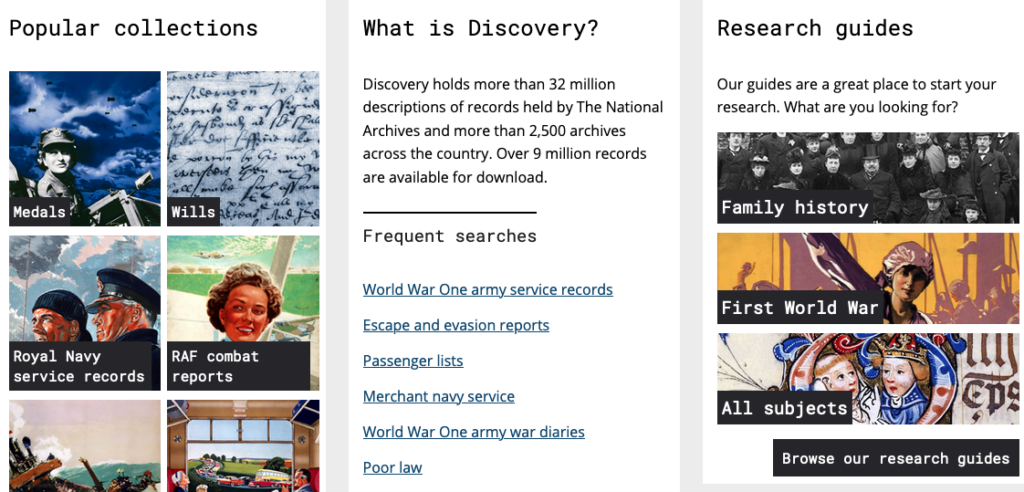
Home page of Discovery within the TNA website
For me, Discovery is the amazing online catalogue of The National Archives (UK). It has so many features I could write dozens of blog posts. But the editor has limited me to so many words, therefore this will be a few of the highlights in my own search of Discovery.
Let’s get the numbers out of the way first. Discovery holds more than 32 million records held by The National Archives AND more than 2500 archives across the UK. It is not just what is based at Kew but all those other smaller archives which may have specific items on our ancestors. Did I mention that there are over 9 million records available for download and thanks to Covid, these are currently free?
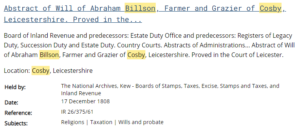
Abstract of the Will of Abraham Billson.
You can search for a specific UK archive but in this blog post I am limiting myself to just a few examples from my own research to whet your appetites for Discovery. A simple search by keyword can turn up some surprising family treasure. By entering Abraham Billson with no dates or other filters, I located the will of Abraham Billson, farmer and grazier of Cosby, Leicestershire who is Max’s GGG grandfather who died in 1808. Then I downloaded my free copy of the document which listed his children and worldly belongings.
Keeping it in the family, I then looked for his daughter, Dinah Billson who married Joseph Spencer in 1816 in Cosby, Leicestershire. There were two records for Dinah Spencer, both mortgage documents relating to various properties in High Street, West Bromwich. Also on the documents was her son Paul Spencer, a chemist and druggist. Obviously, the family were quite prosperous. These mortgage records were held by the Sandwell Community History and Archives Service which I had never thought to look at prior to this Discovery search. Sadly, the documents have not been digitised. Still a find like that is worth paying for copies to be done.
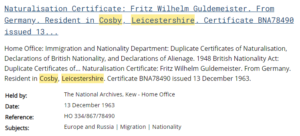
The Naturalisation Certificate of Fritz Wilhelm Guldemeister from Germany, resident in Cosby, Leicestershire, England.
As well as family names, you can search for a place. Cosby, Leicestershire returned 270 results with references to other families in the parish who may be connected to your family. Sometimes you can be totally surprised by what turns up. For example, the image on the left is a naturalisation certificate for a person of German nationality who lived in Cosby, Leicestershire in 1963.
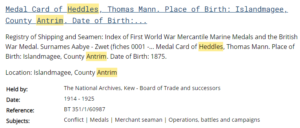
First World War Mercantile Marine Medal Card of Thomas Mann Heddles born in 1875 in Islandmagee, Co Antrim.
What about Northern Ireland? A search for Heddles and Antrim returned a record for a merchant seaman in World War One. Although only one record, it mentioned the place where my father’s family came from. Another search for Islandmagee returned over 800 records including photographs. Most of my families were involved in the sea and the entries for Registers of Shipping and Seaman listed many family members giving age, place of birth and other information.
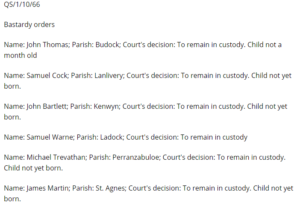
Cornwall Quarter Session Bastardy Orders listings.
For those who may have illegitimate ancestors, an interesting search is ‘alleged father’, and this returns 1658 records. You can add surnames or places to narrow that down. Another similar search would be ‘bastardy order’. The left hand image shows the quarter session decisions of a jury in Cornwall in 1820. I was surprised to see the alleged fathers held in custody even before a child was born. Many of the Discovery records have detailed catalogue notes which help to explain the records in more detail.

Removal Order for John and Chrstian Rosewarne and their daughter from Marazion to St. Hilary in Cornwall.
Similarly, you may be able to pick up direct references to removal orders as the image shows. John and Christian Rosewarne and their two young daughters were removed from Marazion, Cornwall to St Hilary, Cornwall in April 1828. Note the Cornwall Record Office is now known as the Archives and Cornish Studies Service, but the catalogue entries have not been updated.
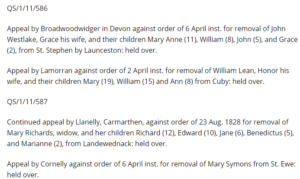
Removal Orders for whole families in some instances.
There were appeals to removal orders and in many of the Quarter Session records there are detailed listings of these appeals. The actual records would provide even more information than the abstract entry. On the right are a few examples which illustrate that whole families, widows and their children and single women were all impacted by removal orders.
Points to remember are that not all archive series are listed in detail or indexed by name or place. Not everything is online or digitised. Most archives these days have their catalogues online and looking local for our ancestors is what we all should be doing.
Discovery https://discovery.nationalarchives.gov.uk, the online catalogue of The National Archives (UK) and its 2500 participating archives, has much to offer family historians downunder. If you are not familiar with it, now is the time to search for family names or places. You might just be surprised at what you discover. Good luck.

Hi Shauna, my first thought on hearing the word Discovery was also the UK National Archives site, so thank you for highlighting this. It’s a fabulous portal to records held not just at TNA but to records held elsewhere. Pauline
Thanks Pauline. It is simply fab isn’t it? Shauna